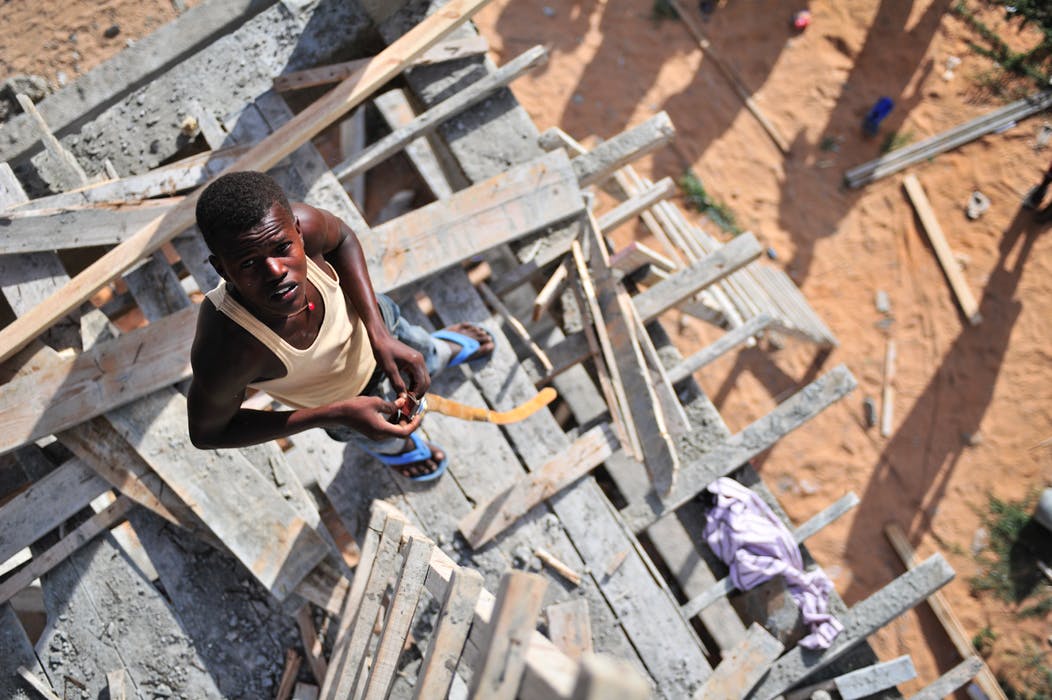COLD IRONY
The black van slowly cruised down the windswept Itam street, its tinted windows masking the presence of the three men inside, each carefully scanning the area for any sign of the freelance skilled labourers who usually gathered at the street corners every morning, offering their services to anyone who had work and was willing to pay.
Outside, a cold harmattan breeze blew, rustling the dried leaves that lay about and whipping up dust and debris into tiny whirlwinds. Pedestrians huddled in their clothes, heads down and eyes squinted to avoid the dust as they hurried off to work.
“Look,” one of the men in the van growled, pointing at some figures at the far end of the street.
“These ones are boys,” said the second man.
“It doesn’t matter. They’re alive and fit. They’ll be okay for the job,” replied the first.
“Should I park?” the driver asked, looking in the rear-view mirror. He caught the nod in reply, acknowledged it with one of his and drove on, towards the boys.
The six teenage boys lazed about in the uncompleted building, paying no particular attention to their surroundings. The weather didn’t seem to bother them; too many nights out in the cold had toughened their skins. One of them, Aniedi, sat on a window ledge, watching three huge rats rummage for food in a nearby garbage dump. For a second, he wondered if they carried the dreaded Lassa virus, the one the people on the news said was ravaging the country.
He shivered involuntarily, his threadbare shirt offering very little protection against the bite of the cold. His lips were cracked in several places, but he was afraid to lick them—that only made the pain worse.
Across the street, a homeless old man hobbled along; he stopped every now and then to in to short wracking coughs which made his slender frame shudder. Harmattan and the old man’s cough reminded Aniedi of his father’s death, which had heralded the end of life as he knew it. The fire had come swiftly like a thief in the night, ravenously eating up everything in its path. It’d left just as it had come, without a backward glance at its legacy of the charred remains of Aniedi’s home and his father.
Time had slowly erased his father’s face from memory but had left untouched, his favourite saying, repeated so often during his lifetime, that it had stuck.
“Son, if you work hard in this life, one day, you will become a pillar of society.”
Aniedi was the first to see the black van arrive and park opposite the building. Two men dressed in starched white kaftans and tooled leather slippers men got out and crossed the street, headed towards them. The other boys stopped talking; everyone became alert.
“My guys, how far?” one of the men asked. “Abeg, una dey do labourer work?”
“Oga if you get work, we go do am. How much you go pay?” asked Obieze. He was the unofficial spokesman for the boys. He eyed their clothes with suspicion; everything they wore was white. Who wore white during such a dusty season?
“Three five,” the man replied.
Their eyes bulged. That was double the normal day’s wages. Such fortune this early in the morning, was almost too good to be true.
“We go do am,” Obieze answered, not bothering to ask for details. It was better not to look a gift horse in the mouth.
Forty minutes later, they arrived at the site of a new shopping plaza in the middle of town. Their jobs were to carry blocks to the masons. Except for the boys, the other men worked without saying a word. The hours passed and soon, dusk arrived.
They were all lined up to collect their money when without warning, Aniedi felt strong hands grab him from behind and violently bundle him to the ground. Around him, his friends cried out in pain, surprise and anger.
“Wetin be dis?” Obieze bellowed, putting up a struggle. “Leave me! I go wound you o! I say leave me!”
On the ground, trussed up like a goat, Aniedi looked up into the hard, unsmiling faces of two of the masons. Something told him begging would be pointless. Each boy was quickly dragged to the six concrete pillars which held up the building’s first floor and tied up securely, like robbers at a firing squad.
“Seal them in,” ordered one of the men who’d brought them.
Their screams and tears were ignored as concrete was poured into the wooden molds which circled each pillar and inch by inch, they were walled into the pillars, unwilling sacrifices to someone’s greed and misguided belief that human offerings would bring prosperity.
Just before he breathed his last, Aniedi lips twisted in a mirthless smile as he thought of the cold irony. His father had been right. His hard work had made him a pillar, only not in the way they’d both dreamed.

Try Our Service Befre Buy🎁
we have paid service too so please check them too. Active the free upvote service and learn more about it here : JOIN NOW CLICK HERE
Congratulations @ketimae! You have completed some achievement on Steemit and have been rewarded with new badge(s) :
Click on any badge to view your own Board of Honor on SteemitBoard.
To support your work, I also upvoted your post!
For more information about SteemitBoard, click here
If you no longer want to receive notifications, reply to this comment with the word
STOPDo not miss the last announcement from @steemitboard!